
ISLAMABAD: A usual day for 21-year-old Absar Ali starts at 8 am when he has breakfast and leaves to go to university. From there he heads to the Yinhe Ping Pong Club in Peshawar Sports Complex to coach girls in the afternoon. As their session finishes, he begins his own practice. At around 9 pm, he heads home and begins work on his assignments. A regular weekday comes to an end at around 3 am, only to start again in five hours.
In 2016, Ali beat India 3-0 in the Table-Tennis World Championship. But his team still struggles to get sponsorship. Considering that the sports board and associations are not even willing to sponsor the boys, getting sponsorship for girls to play the same sport is a mammoth task. But Ali is hopeful, as he believes opportunities find those who keep looking for them. Just like the one that found him.
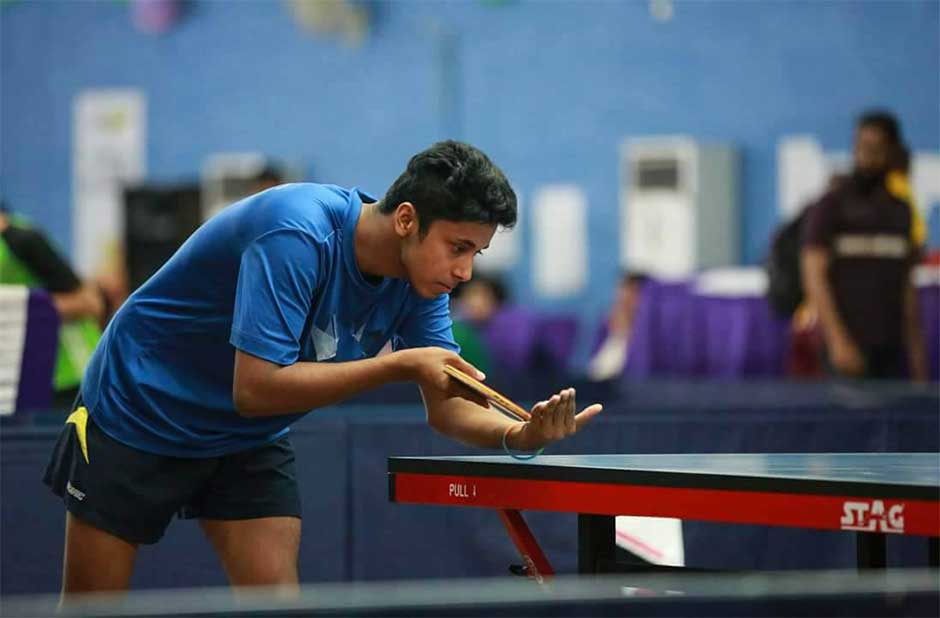
Absar Ali PHOTO: Shanel Khaliq
Around five years ago, Khyber-Pakhtunkhwa (K-P) did not have a girls’ team. So Coach Kifayat Ullah Khan, who is also the K-P Table Tennis general secretary, invited Ali to go along with him for a talent hunt across the province. “We selected around 30 girls from the trials but at the end of the day, only five got the permission to play,” he said, adding that even those five were not completely free from structural hindrances such as transport problems.
But he came up with a way to incentivize the parents. Slogans about girls’ empowerment were not enough as sometimes they would have the opposite effect. So, he began to invest whatever savings he had into stocks. This generated profits. He used these profits to pay these girls a stipend. The parents of these girls thought that their daughters were playing for the government and hence were getting paid.
Afghanistan’s wheelchair basketballers shoot to win
Due to his efforts, K-P is now bringing forth national champions in the sport. One of his students, Hiba, is the Under-12 National Champion who hails from Swabi. “We go to Swabi every month and try to recruit girls from schools that have boarding. When girls are away from home, they can come out and play easily and we help them improve their game,” he explains. But Ali himself never had such an opportunity when he started playing the sport as an eight-year-old. “I watched videos online to learn the sport,” he remarks.
Ali, however, has been mentoring these girls not just in the sport but also otherwise. He has been helping them get psychiatric help to cope up with the challenges that come with being a female athlete from their area. “I have always emphasized the importance of both balancing sport and education alongside my students. I have done that myself, so anyone can do it,” he says.
Apart from engaging them in sports, he also wants to engage girls in leadership activities. “Even girls who don’t play sports have so many roadblocks in everyday life. I once had a girl come up to me in one of the trial sessions and she told me that baby girls in her family are still buried. Imagine! In this day and age,” he said.
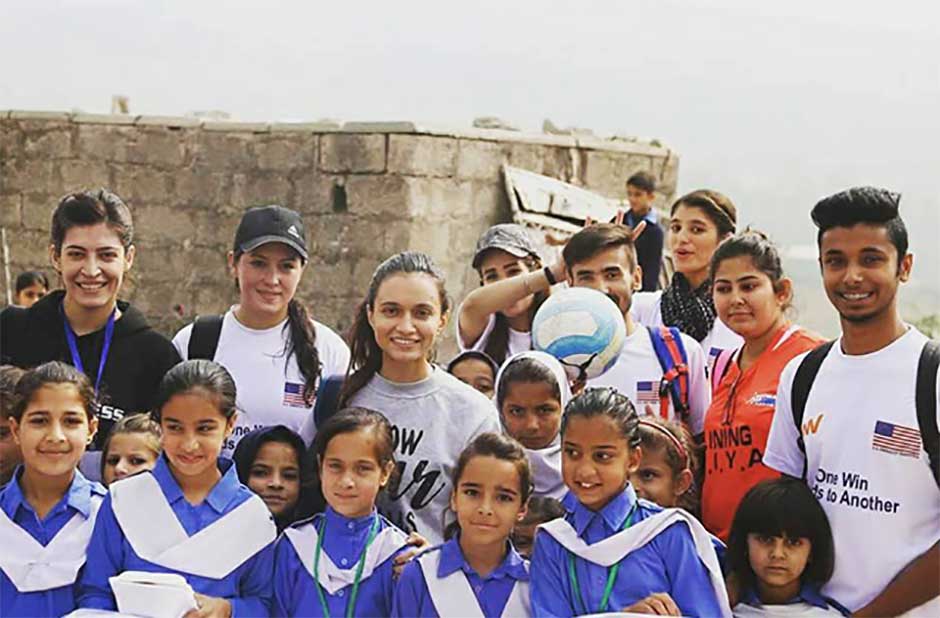
Ali’s Table Tennis girls’ team. PHOTO: Shanel Khaliq
It was these stories that moved him. Since he grew up in a relatively privileged and supportive family, he did not realize the kind of obstacles that were put forth, particularly for girls and persons with disabilities. “Once I got out there and heard these stories, I just knew I had to do something. These kids are an inspiration for me,” he says.
However, even the world of coaching and mentoring is not without its perils. Many coaches prey on young girls who come to them asking for guidance. “A lot of these coaches know that in an area like K-P, many girls who come forward to play don’t have their family’s support. So they [coaches] pounce at the opportunity of manipulating them,” he says.
But Ali does whatever he can to make his girls feel safe, by even walking them home. Earlier, when his students walked out of the sports complex, boys would jeer at them and harass them. So now he makes sure that everyone leaves together as a group and he drops them safely to their homes. Even at the complex during practice sessions, boys sometimes walk in and bring their friends along to ogle at the girls and make them uncomfortable. Ali then had to put up a sign saying ‘outsiders are not allowed’. However, the very next day someone had torn it. “I had to speak to management. Such things are part of our daily struggles,” he says. “People came up with all sorts of nasty names for me. But they all had to shut up once they saw that my students were competing nationally and winning,” he adds.
In fact, Ali is also passionate about helping athletes with disabilities too. For the past year, he has been associated with the National Paralympics Table Tennis Association and is helping them acquire wheelchairs.
From the spot
Along the curvy bends of the Karakoram Highway, things in Gilgit-Baltistan (G-B) have been more promising. The Hunza valley boasts a literacy rate of 95% for both genders, higher than any area of Pakistan. A large part of this has come about by the efforts of community-run schools and locals’ passion for education.
The valley of Shimshal, in the region, majestically stands in the Gojal, Hunza-Nagar district at a height of 10,213 feet. Today it is home to not only breathtaking landscapes but also the first female football club in the region: Al Shams Football Club.
The club is the brainchild of a 19-year-old boy from the valley. Munawar Spicher only recently graduated high school and is looking to start university in Lahore. But he was a football lover since he was a five-year-old.
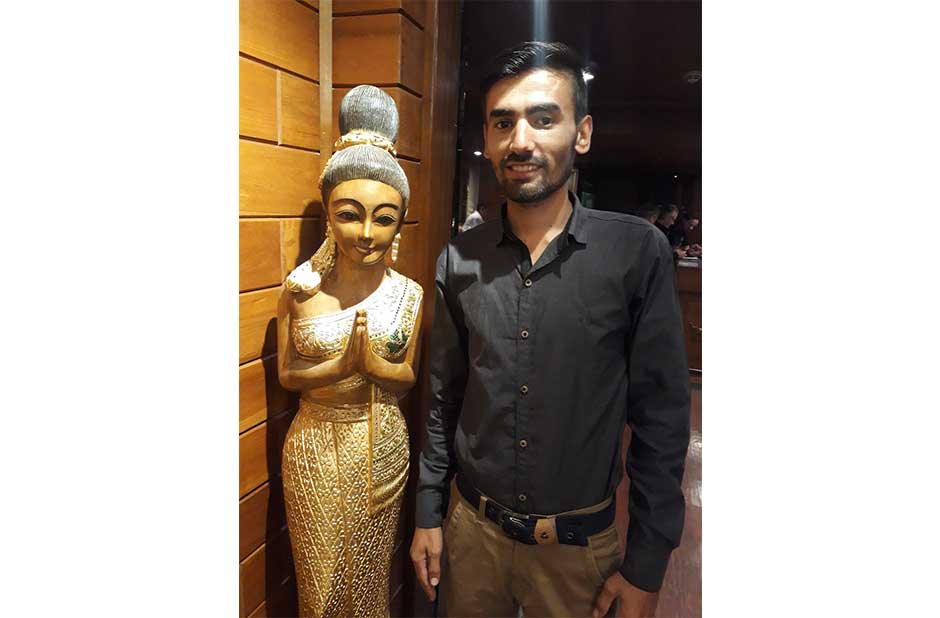
Munawar Spicher PHOTO: Shanel Khaliq
“I didn’t like going to school, I always wanted to be outdoors, playing cricket or football. It was like I had become famous in the valley for missing school,” he laughs. His attitude worried his family, who thought he would grow up to be a shepherd in the valley.
In a country like Pakistan, education is seen as the only means to social mobility and success, and so most parents see higher grades as the only mark of success for their child. Sports are rarely seen as something beyond a means to stay fit and spend time in a healthy way.
6 awe-inspiring Pakistani female role models you should look up to
But Spicher felt that sports were bigger than that. It could be a means for empowerment and development. A few years back he was visiting his cousins, who had moved to Lahore. Three of them had joined a local football club and took him along to watch a game. “Sitting there watching the game I thought to myself, why do we have to move to Lahore to play football, why can’t we have something like this back in Shimshal,” he says.
That is when he got back to the valley and started brainstorming with his peers and family. Finally, in 2016 together with Karishma Inayat and Azeem Baqir, he founded the Al Shams Football Club, focusing on girls only. He feels that although women are getting educated in their area, they often get fewer opportunities than their male counterparts in every aspect.
“I saw my cousin Karishma get into one of the most renowned universities of the country on the basis of a sports scholarship, and I thought what could be better than that. Not only was she going to play the sport she loved but her parents were also relieved of the financial burden of paying her fee, which is quite a big stress for most people, especially in our area,” he says.
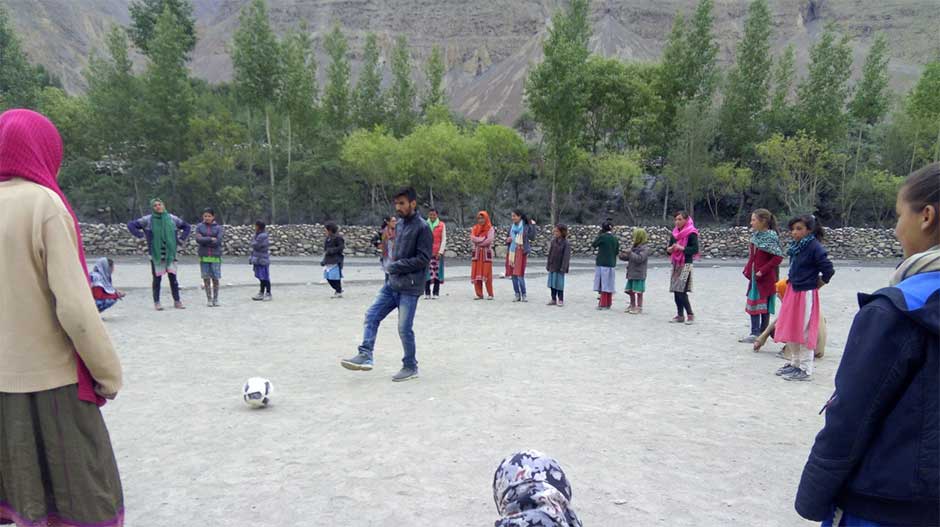
Al-Shams Football Club. PHOTO: Shanel Khaliq
The club is only into its third year of existence but has established a name for itself. Initially, people in the area were a bit apprehensive because no one had done something like this before. They feared that engaging in sports would waste their girls’ time and they might spend less time studying.
But now they have a team of 14 girls, showing up for practices regularly. Spicher, Baqir and Karishma lead the practices, supported by their peers and local players such as Mehtab Ali Shah.
The issues they face mostly are in regard to a lack of sponsors. However, the community’s support is helping the club sustain. “The hardest part is convincing people that sports can be a vehicle for change. It is simply not about being active or staying healthy,” he says.
Spicher wants to see his girls play like Sana Mahmud, the captain of the Pakistan National Women’s Basketball team and former captain of the Pakistan National Women’s Football team, and represent Pakistan someday. “For now, I want my team to get a chance to play in cities like Islamabad and Lahore to help increase their confidence and exposure,” he says. One day he sees the presence of Al Shams Football Club in all rural areas of Pakistan, producing world-class players.
Counterpunching the discrimination
Far in the south of the country, crossing the narrow and crowded streets of Lyari, one of the most notorious constituents of the provincial capital Karachi, Pak-Shaheen Boxing Club seems to offer a heavenly escape.
The walls are adorned with pictures of world-renowned boxers such as Muhammad Ali along with local players. But walking in there at 3 pm every weekday offers a startling view – adolescent girls engaged in a fight in the ring.
Pak Shaheen Boxing Club opened its doors in 1992, but only started training girls in 2016. Muhammad Younus Qambrani, the founder of the club comes from a family of boxing addicts. Qambrani became interested in boxing when he was a child. He had a number of health issues so he tried to engage himself in a sport that would help him remain fit. “We used to get this toy back in the day, where two characters would be fighting each other on a ring, operated by a battery. I would play with it all day until it crashed,” he laughs.
Qambrani grew up to study and train at the Haji Abdul Haroon School and College in Lyari that has also produced a number of big names in the field of sports. He has two daughters and the older one, Anum, is credited as the first female boxer from Lyari. Qambrani would train his girls at home from an early age so when he saw the interest in his community he decided to start official training at his club.
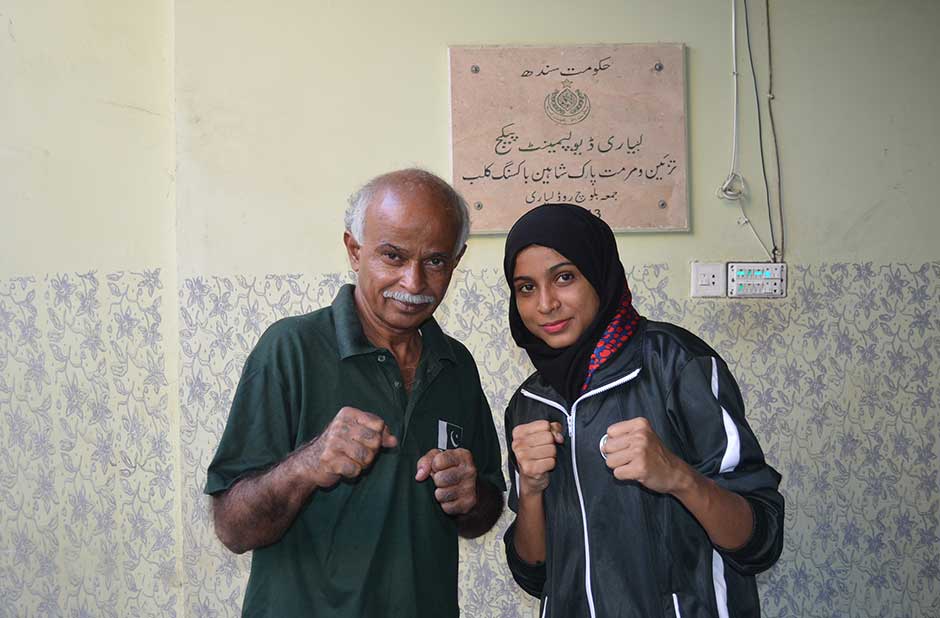
Muhammad Younus Qambrani and his daughter, Anum – one of Lyari’s first female boxer. PHOTO: Shanel Khaliq
“Initially people would laugh, talk behind my back but no one had the courage to come up to me and say something because there’s nothing wrong with what I do,” he says confidently.
Today three other clubs in Lyari have followed in his footsteps and started training girls. Qambrani’s students have gone to represent Pakistan internationally as well. “Nadir Khan, the head coach for the navy, came to me when he was a five-year-old to train. I feel proud when I see my students become stars,” he says.
Fight like a girl: Women in sports negotiating athletic ability and femininity
Meanwhile, another student of his, Nadir Katchi, assists him in training the girls. Katchi, the number one boxer from Karachi for three consecutive years (2012-2014), feels that he is living his dream through these girls. “I couldn’t continue to compete in the next category of boxing because I stopped gaining weight but this was my passion and I thought even if I can’t compete ahead, I can still coach,” he says.
The last tournament that the club participated in was organized by the National Bank and had 60 girls playing in it. “We have girls that have played 12-15 fights and remain unbeaten. If we are able to get the right kind of facilities and patronage, I have no doubts that my girls can compete internationally,” says Qambrani.
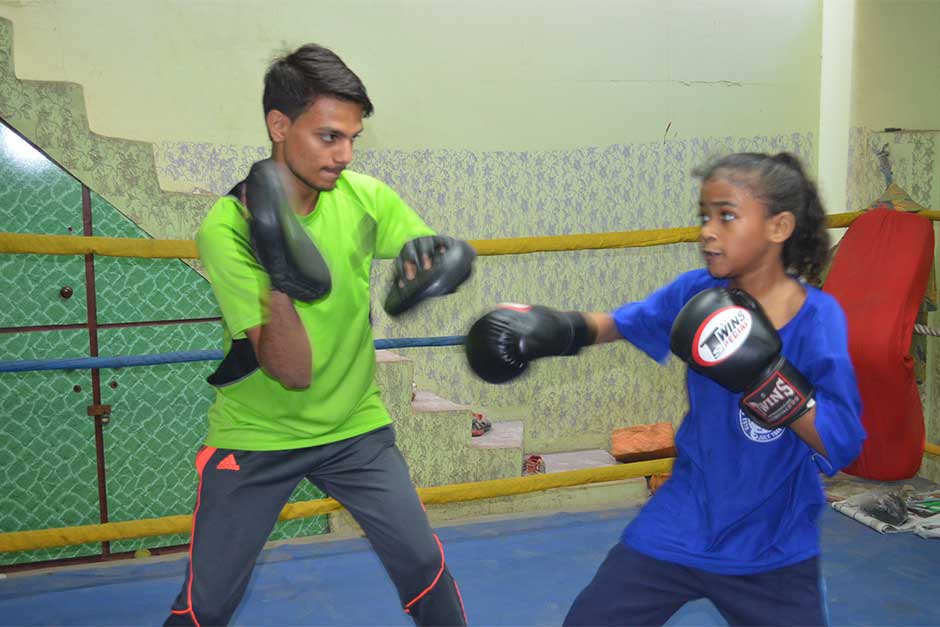
Nadir Katchi at the Pak Shaheen Boxing Club. PHOTO: Shanel Khaliq
He feels that the people of Lyari have come a long way with regards to understanding girls’ right to play. However, he feels sports overall have suffered due to the role the internet and social media have acquired in people’s lives.
“Back in the day it was easy, either people would be focused on getting an education or playing a sport. The whole neighborhood would gather at matches in the evening and cheer. Today it’s so hard to bring kids toward sports because they are obsessed with gadgets and mobile phones and can spend the entire day on them,” he reminisces.
But Qambrani is set to break this norm and empower women. Hence, in the evenings he also gives tuitions to girls from the neighborhood. He feels that Pakistan can only move forward if its women walk alongside men.
Engaging men for gender justice
According to the World Economic Forum’s Global Gender Gap Report 2017, Pakistan ranks as the second-worst country in the world with regards to gender parity. But within the country itself, different regions reflect different practices on the subject. The rural areas of the K-P province fare the worst according to a Pakistan Integrated Household Survey of 2002. Similarly, in Fata, the literacy rate for women stands at 7.8%.
These statistics are partly also owed to the conservative moors of traditional Pashtun society. Unfortunately, the battle for gender equality in many regions of the province is still hovering at a girl’s right to education and mobility. A research study by Aamir Jamal titled ‘Engaging men for gender justice: Overcoming barriers to girls’ education in the Pashtun tribes of Pakistan’ suggests that engaging with community elders, particularly religious scholars is the only way to move forward. Participants in the study also suggested the role of radio, particularly as an effective medium to spread such ideas, as people still gather together in the evening to listen to it in many parts of the province, where access to television is not as common.
For a girl to play a sport, that too at a professional level, is considered an aberration. But many from the country want to fight these archaic notions and there is consensus that this feat can only be achieved with getting men, such as Ali, Spicher, and Qambrani on board.
